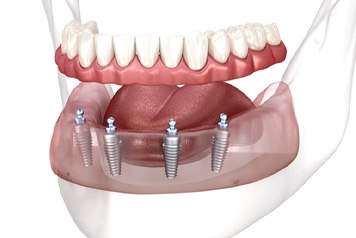Dentures – Lenox, MI
A Reliable Way to Replace All Your Teeth at Once
Is severe tooth loss affecting your ability to enjoy a healthy diet and speak clearly? It’s much easier to get the most out of life when you have a full set of beautiful teeth. With dentures, it’s possible to replace multiple missing teeth at the same time. Feel free to reach out to our team at Forever Young Dentistry Bayside if you are interested in asking Dr. Young and Dr. Samona for customized, comfortable, long-lasting dentures in Lenox.
Why Choose Forever Young Dentistry Bayside for Dentures?
- Enjoy New Dentures After a Single Appointment
- State-of-the-Art Cone Beam Scanner
- Variety of Dental Plans Accepted
Who's a Good Candidate for Dentures?

You’ve likely known people who have been able to get more out of life thanks to their dentures. But how will you know if this tooth replacement method is truly the right choice in your particular case? The best way to find out for sure is to speak to a trusted dental professional. Feel free to call us to set up a consultation; our team will be happy to evaluate the state of your smile and determine whether you’re a good candidate for beautiful, custom-made dentures.
Effects of Missing Teeth

You may be considering dentures if you are missing any number of teeth. There are many possible causes of tooth loss, including gum disease, untreated tooth decay, and sudden injuries involving the mouth.
Regardless of the exact reason why there’s a gap in your smile, you can be sure that missing teeth can lead to serious problems. For one thing, chewing will become more difficult, and you might be unable to eat some of your favorite foods. Also, people might have a harder time understanding you when you speak. And of course, you may find your self-confidence suffering due to being unhappy with the way your grin looks.
What Qualifies You for Dentures?

Thanks to dentures, you don’t have to go through life with an incomplete smile. But are you qualified for this form of tooth replacement? The answer is likely yes if you have lost a significant number of teeth. You could also be a candidate if you need to have multiple teeth removed due to extensive decay that can’t be treated through other means.
Note that in order to get dentures, you must have healthy gums as well as a certain amount of bone in your jaw. Our team will evaluate the state of your mouth to see if there are any issues that might need to be addressed.
In addition to confirming whether you’re able to get dentures, we will also narrow down the kind of prosthesis that best suits your needs. Some patients are only missing a few teeth and can have the gaps filled in with a partial denture; others have lost an entire arch and require a full denture. And of course, implant dentures are certainly worth considering for those who don’t want to have to worry about their new teeth slipping at the wrong time.
Alternative Tooth-Replacement Options

What if you find out that dentures aren’t the right choice for you? No need to worry! There are other ways to revitalize your smile after tooth loss:
- You can get a dental bridge to replace one or more teeth in a row. A traditional dental bridge is attached to two of your natural teeth so that it can fill in the gap between them.
- You can get dental implants to replace any number of teeth. Dental implants offer better strength and stability than traditional tooth replacement methods because they are inserted directly into the jawbone.
Types of Dentures

Different types of dentures are designed to accommodate the needs of different patients, and our team can review your options with you and explain the unique advantages and disadvantages of each option. When it comes to full dentures, there are three main kinds you can choose from based on your specific needs. Here’s what you need to know about each type:
Partial Dentures

A partial denture is crafted from a gum-colored acrylic base to address one or several missing teeth. These appliances are designed to snap onto your healthy natural teeth, allowing them to securely and comfortably hold their place as they fill in the gaps in your smile.
Full Dentures

A full denture is designed to fit comfortably on your gums while mimicking the appearance and function of your natural teeth. Full dentures can be held in place with natural suction or denture adhesive, allowing patients to chew a wide variety of foods. If you need to have teeth extracted, we will normally wait to give you your full dentures until after your mouth has finished healing.
Implant Dentures

Implant dentures are more secure than traditional ones thanks to the implant posts that form a permanent bond with your jaw. The number of dental implants you need can vary depending on the level of bone density in your mouth. Dentures secured with implants easily hold their place in the mouth and can restore a remarkable amount of chewing power.
How Dentures Are Made

For those who’ve struggled with tooth loss for some time, dentures might be one of the most versatile and reliable solutions out there. These personalized prosthetics can help replace missing teeth while restoring your smile and improving your confidence. But how exactly are they made? Making your new teeth involves multiple steps, all to create lifelike results that you can enjoy for years to come. Here is how dentures are made and what you can expect after receiving yours.
What Are Dentures Made Of?

Dentures are typically made of two components: the base and the teeth. Here’s a brief look at each:
- Denture Base: This is the gum-colored foundation that is designed to hold the artificial teeth in place while also seamlessly blending in with the rest of your mouth. The materials used may include either acrylic, nylon, or resin to create a natural-looking structure. While full dentures mostly consist of one material, partial dentures may include metal clips within the acrylic base to clasp onto nearby teeth for support.
- Artificial Teeth: Your new pearly whites will be attached to the denture base and will typically be created out of resin or porcelain, depending on the kind of prosthetic you need. While both materials can mimic natural tooth enamel, porcelain is typically chosen due to its incredible durability. However, resin is generally used for partial dentures, as it won’t be as abrasive to normal teeth as porcelain.
The Denture Creation Process

To develop your personalized and lifelike dentures, here are the steps involved in the process:
- Our team will take impressions of your smile as well as measurements of your jaw to create a wax replica of your gum line.
- This model will then be sent to a dental lab and used to ensure your final dentures fit perfectly in your mouth.
- After creating a wax replica of your gums, the artificial teeth will be placed via an articulator. The technician will adjust the wax dentures before sending them to our office for a fitting.
- Once we’ve confirmed that they’re the correct size and shape, we’ll return them to the dental lab for completion.
- At the lab, the technician will place the prosthetics in a flask and pour plaster into them to maintain their shape before submerging the flask in boiling water to melt off the wax.
- After making holes in the artificial teeth so they can attach to the material, the technician will inject acrylic to replace the wax.
- Using special tools, the plaster is removed from the dentures before the technician places the prosthetics in an ultrasonic bath to get rid of any residual plaster.
- They will then remove any other excess acrylic from the dentures before polishing them completely.
- Afterward, they’ll send the finalized dentures to our office. You will try on your prosthetics, and if all is well and you’re satisfied with the results, you’ll be free to enjoy your new smile.
Adjusting to Your New Dentures

Most patients may experience an adjustment period when first wearing their prosthetics. You might feel some soreness as your gums will need to get used to having your dentures on top of them. You will also need to learn how to chew comfortably and speak properly, which will simply take time and practice. During your temporary adjustment process, make sure to eat softer foods and exercise your facial muscles frequently. If you notice any abnormal changes or discomfort with your prosthetics, let our team know so we can help address the situation.
Benefits of Dentures

The loss of multiple teeth can have profound effects on your daily life. Things that used to be simple, such as eating and speaking, can suddenly become monumental challenges. The good news is that modern dentistry offers some truly remarkable tooth replacement options, including dentures. A new set of prosthetic teeth has the potential to improve your confidence, make everyday tasks easier, and improve your overall quality of life. Continue reading below to learn more about the many benefits of dentures.
Psychological Benefits

Tooth loss can be difficult to accept. Becoming edentulous (without any teeth) may have big effects on how you view yourself and how you interact with other humans. For example, feelings of self-consciousness about your appearance may motivate you to isolate yourself, causing you to miss out on healthy social interactions. Eating difficulties or dietary limitations can have similar consequences. Over the long term, these psychological effects can contribute to depression and physical health problems.
Dentures can allow you to eat and speak with confidence, and they can make you look younger. The result is an improved outlook on life!
Clearer Enunciation

Speech is a complex process that depends on interactions between the teeth, tongue, and other structures. Without a full set of teeth, you may find it difficult to clearly enunciate certain sounds. As a result, your speech may seem muddled or slow. This can affect both your confidence and the way others perceive you.
When you first get dentures, you might develop a slight lisp. Thereafter, however, your speech should be as clear and confident as ever!
Improves Nutrition

Some edentulous individuals tend to gravitate toward very soft foods, which means they can miss out on the nutrients in fruits, vegetables, and other somewhat tough foods. After you get dentures, your dietary options will expand greatly. In fact, once you get used to eating with your prosthetic, there will be very few foods that are off-limits for you! Just be sure that you use proper eating techniques to protect your dentures and your oral health.
Preserves Oral Health

If you still have some of your natural teeth, dentures can benefit them in a couple of ways:
- Dentures can serve as placeholders. They prevent your natural teeth from drifting out of place, meaning they can preserve your bite and your smile’s natural alignment.
- Dentures can prevent premature wear and tear. Dentures take some of the stress of eating and chewing, which allows them to prevent extra wear and tear on your natural tooth enamel.
Expands Opportunity

Did you know that the appearance of your mouth — and your oral health in general — can greatly affect how others perceive you? One study from 2019 even found that the likelihood of being employed was negatively associated with poor oral health.
Dentures can improve your smile’s appearance and give the impression that you are youthful, healthy, and energetic. This can help you to make a powerful and positive impact in the workplace.
Understanding the Cost of Dentures

If you’re interested in getting dentures, you’ll naturally want to know whether you’ll be able to fit them into your budget. We want you to be able to enjoy a complete smile again at a price that’s right for you. As such, not only will we answer any questions you have about the cost of your dentures, but we will also work with you to find ways to make your prosthesis more affordable, such as by taking advantage of dental insurance benefits or third-party financing.
Factors That Affect the Cost of Dentures

We can only give you an estimate of what you can expect to pay for dentures after we’ve considered a number of factors, including:
- Related Procedures: You may need to pay to have tooth extractions or other preparatory treatments performed before receiving dentures.
- The Number of Missing Teeth: Are you missing all of your teeth or just a few? The answer to this question can affect the kind of denture you get, thus influencing the price.
- The Materials Used: Dentures made from cheaper materials may cost less, but they also often aren’t as comfortable or durable as dentures composed of higher-quality materials.
Are Implant Dentures More Expensive?

There’s no getting around the fact that implant dentures tend to have a higher cost than traditional dentures. That being said, implant dentures can still be a smart choice for your wallet in the long term. Since they can last for decades, you won’t need to pay to have them replaced very often, if at all. Also, many patients find that dental implants are well worth the cost thanks to the many benefits they offer, including enhanced chewing strength and stability.
Does Dental Insurance Cover Dentures?

Every dental insurance plan is different, so it’s best to always double-check your policy to confirm what coverage is available. That said, you can normally expect your insurance company to help pay for your dentures. Many plans will cover around 50% of the cost of the prosthesis, but this is not set in stone.
Remember, you will need to meet your annual deductible before you can start taking advantage of your dental insurance benefits. Additionally, your plan most likely has a maximum amount that it will pay for dental services each year. Talk to our team if you have any questions about the specifics of your dental insurance.
Other Options for Making Dentures Affordable

Besides insurance, how else can you make paying for dentures easier? For starters, you can sign up for our in-house dental membership plan, which includes discounts on many different kinds of dental treatments. Another option is to apply for a CareCredit financing plan so that you can break up the cost of your dentures instead of paying a single lump sum. Let us know if you’re interested in learning more about these useful financial options.
Dentures Aftercare

Your dentures have the potential to significantly improve your quality of life. However, they will only live up to that potential if you take good care of them! One important thing you must do is visit your dentist regularly for preventive care. We can examine both your mouth and your prosthetic and help you stay on top of any developing issues. We are also happy to provide personalized coaching to help you enjoy healthy smiles for years to come.
Besides visiting us regularly, what else can you do to take good care of your prosthetic? Below, you will find some helpful tips.
Removable Dentures

Remove After Eating
After each meal, it is wise to remove your dentures and rinse them off. This can get rid of lingering food particles and reduce the buildup of plaque. It can also prevent stains, odors, and bad breath. Be sure that you do not use hot water; it might warp your dentures and negatively affect the way they fit. Cool or lukewarm water is better for keeping your prosthetic in good shape.
Clean Your Restoration
Every night, you should thoroughly clean your dentures. Use a soft-bristled brush and a bit of mild, unscented, clear soap to gently scrub all their surfaces. (Do not use regular toothpaste because it can be abrasive; it might scratch your artificial teeth.) Rinse your dentures thoroughly before placing them back in your mouth so your soft oral tissues do not get irritated by soapy residue. If you will not be wearing your dentures again right away, store them in a glass of water or a cleansing solution.
Keep Your Dentures Safe
To prevent damage to your dentures, you should:
- Handle them carefully. Stand over a sink full of water or a folded towel when you remove them. If they fall, you want them to have a soft landing! Otherwise, they could easily break.
- Store them somewhere safe. Pets and small children love to play with dentures! Be sure to store your prosthetic in a location where it is safe from curious minds.
Remove When You Sleep
You should remove your denture before you go to sleep each night. This gives you the chance to thoroughly clean your prosthetic. It also allows your gum tissue to breathe, which can improve circulation and reduce the risk of sores, infections, bad breath, and other issues. Sleeping with dentures has even been associated with a higher risk of pneumonia, so this advice is nothing to take lightly! Store your dentures in water or a cleansing solution overnight so they do not lose their shape.
Notice Changes
As the months go by, you might notice slight changes in your oral health, or you may observe that the fit of your dentures is gradually changing. In some cases, dentures incur serious damage that affects the way they function. Do not try to fix such issues on your own. Rather, visit our dental team for assistance. We will do what we can to get your smile’s health and function back on track as soon as possible. Often, doing so is as simple as relining (adjusting) a denture that no longer fits well.
Dentures FAQs
How Long Will You Have to Wait to Get Dentures After Your Teeth Are Pulled?
The average wait time between having teeth extracted and receiving dentures is about six to eight weeks, but the precise length of time depends on the type of denture used. This period gives the gums time to heal and the dentist and patient time to make sure that the dentures will fit properly. While immediate dentures can be placed on the same day that the patient has the necessary teeth removed, this won’t give the dentist the time to ensure a proper fit, so the dentures may require adjustments as the bones and gums heal. Implant dentures, on the other hand, usually require patients to wait between four to six months before the restorations are placed so the implants can fuse to their jawbones through the natural process of osseointegration.
Do Dentures Break Easily?
While dentures are designed to be incredibly durable, they are not invincible and can last between five and seven years on average. However, accidents will happen, and the most common cause of denture damage is dropping the appliance while cleaning, removing, or inserting it. Dentures may also break due to fitting poorly or small flaws in their bases such as notches or scratches. Even a pair of dentures that receives excellent care can become worn down due to the stress of repeated use.
What Should You Do if Your Dentures Break?
Whether your broken denture can be repaired mostly depends on the nature of its damage, and you should call our office as soon as you notice any problems. The most serious damage a full denture can sustain is a “prosthesis fracture,” which means that the appliance has broken in half. This problem is more common in top dentures, but it can happen to the bottom one as well. If the denture can be repaired, we may do so by fixing broken chipped or cracked crowns with composite resin, relining it so that it fits better, or sending it back to the dental lab. However, dentures do not last forever and will eventually need to be replaced.
Can I Reline My Dentures Myself?
The rise of social media has led to the spread of much bad advice, and many people injure themselves by attempting DIY dental procedures they found on the Internet. Some influencers promote products that purport to allow people to repair their own dentures, and many stores carry these items. The truth is that it requires years of dental training to know how to reline dentures properly, and attempting to reline yours on your own can ruin the way they fit, permanently damage them, or injure your gums by improperly redistributing your biting pressure. If your dentures are no longer fitting well, give our office in Lenox a call so we can address the problem properly.

